- From Faith Current: “The Sacred Ordinary: St. Peter’s Church Hall” - May 1, 2023
- A brief (?) hiatus - April 22, 2023
- Something Happened - March 6, 2023
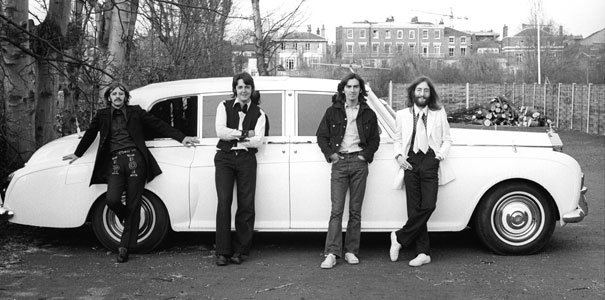
The Beatles, not worrying about global warming, 1969.
In the midst of a comment thread, I stumbled on an interesting thought which I wanted to open to the group: how do you think The Beatles’ legacy would’ve been different if they’d never returned to the studio after Let It Be?
My initial, instinctual thought is that the group’s demise would’ve been even more mythic, even more shrouded by “what might have been.” The rich sprawl of White seems to invite a follow-up of the quality of Abbey Road, and had the wet firecracker of Let It Be been The Beatles’ last recorded work together, I think people would’ve felt even more grief when it was all over.
Surely White would be under the microscope in a way that it usually is not, and some songs in the catalog would loom larger — “Blackbird,” for example. “Paul’s waiting for his moment to arise; he’s taking his broken — ie, clipped — wings and learning to fly. So you see, even as early as Spring 1968, Paul’s thinking of leaving.”
For all of White‘s bursting-at-the-seams fecundity, it has nothing of the valedictory to it; not for a second does Ringo’s maudlin “Good Night” feel like a sincere summation. (It’s always struck me as a lullaby penned by a father struggling to be sincere in his fatherhood.) Whereas the entire medley on Abbey Road definitely does have that quality — “this is who we are, and this is what we have learned…goodbye.”
On the other hand, perhaps the group wouldn’t have split permanently, if they’d had a good long rest after January 1969. Opinions?

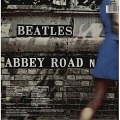
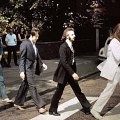

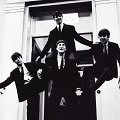


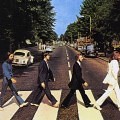
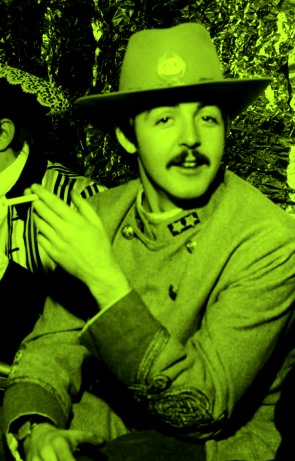
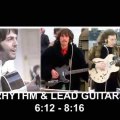

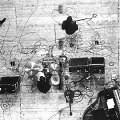
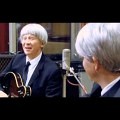
I’ve always loved Let it Be for some reason, but I think the biggest mistake that Paul ever made in the band was getting them all back to work so quickly after the White Album was finished. They needed a year off, and badly. Abbey Road certainly was the perfect Last Album, though. It is filled with great, polished songs, but it also stands apart from the rest of their catalog in some way. Maybe its the sound of the record, or the newer recording gear they were using then. It’s a glimpse of what other Beatles albums would have been like if they could have kept it together. A little less team spirit, but more polish.
I agree unreservedly! It’s one of my favorite “Beatle Dreams” to fantasize about what may have happened had Paul NOT made that mistake. Maybe some REALLY interesting solo music?
As for “glimpse of what other Beatles albums would have been”, however, I must admit that I sometimes feel that they were already spent by that time (AR) and knew it (hence the Herculean effort to throw everything they had left onto that one album), and that not much more impressive stuff may have followed. Maybe this is a too-literal interpolation of the way I feel about much of the solo stuff these days (including the records which usually receive a lot of praise), and maybe I’m just ignoring the notion that IF they had managed to keep it together, we could actually have avoided all that idea-amputated stuff on Plastic Ono Band (much of which I dislike) and McCartney (much of which I react to with a bemused “huh?”). And Apple Jam. And Beacoups of Blues. And they could have done Bangla Desh together. Sigh.
@Velvet, a thought on the spentness:
I think McCartney’s efforts were certainly Herculean, but Lennon’s were typical of his post-Pepper participation, yes? Some great songs, but “not doing all the little things” anymore. And then shitting on the LP for being just adequate, an opinion held by exactly no one else in the world (which was what made it so fun for him to say). Here’s what he said later about Abbey Road:
Though the “one final push” is a nice story, and comforting in its way (in that there were no gems left unearthed), I don’t think the group was spent at all. Abbey Road proves that McCartney could still do all the things that he’d done since Pepper, and more. George was now as good a songwriter as John, at least for the moment. If John had actually committed to the Beatles again, who knows what they would’ve accomplished? The “spent” feeling — which I feel so powerfully in White, as well (though I’m alone among Dullbloggers in that) — is, I think, simply Lennon checking out. Is it just a coincidence that this coincides with his heroin period? I don’t think so.
Let It Be — the sessions, the vibe, the LP — is nothing more than White without the benign influence of India. We’ve heard it before, and better. Abbey Road on the other hand is a definitive break, and shows the group stepping into the 70s six months before the rest of the world. The Beatles were so far from spent that after they split up — for every possible reason besides musical, though John and Paul and George were always careful to slag the others, in that scorched-earth period — their “idea-amputated” scraps created McCartney, POB, and All Things Must Pass. The skeletons of great albums, but forever defined by the other Beatles they desperately needed to become classics.
Taking a break — making solo work without closing the door on the Fabs — might well have made for the best of both worlds: better solo stuff, and more Beatles product. Or maybe Lennon would’ve just drifted away sooner; he’s just such a knucklehead during this period, completely reactive and completely focused on HIS ideas, HIS opinions, HIS status within the group…
“it also stands apart from the rest of their catalog in some way”
Quite agree, @King. I’ve always chalked it up to the equipment, and the advent of the 70s. I think The Beatles entered the 70s a little quicker than the rest of the world — Abbey Road to me is a firmly 70s album, not a 60s one — which is, in part, why I don’t think they were spent.
If they’d had a rest after January 1969 . . . . now there’s a question. Very hard to say what might have happened, I think.
But I agree that if they had to break up, at least they said goodbye with “Abbey Road.” Ending with “Let It Be” would have been going out with a whimper.
It was “Abbey Road,” specifically side 2, that got me started loving the Beatles back in the 90s (I’m a late bloomer, what can I say). “Here Comes the Sun” + the long medley — now that’s going out with the right kind of bang.
Only Lennon would claim to not remember what was on the album one year after it was recorded and released. Its especially funny when you realize that AR was/ is the source of enormous wealth for these guys. Do you believe for a minute that he didn’t ever look at his royalty statements or publishing checks? Also, I think that we fans can be a little bit too hard on the solo albums. Having to fill an entire album with completed songs, instead of coming up with 4 or 5 and helping bang the other fella’s tunes into shape is a huge deal. It is strange that they kept to the album (or 2) per year release schedule during those early solo years. Might have been a better idea to store up the best tunes and skip the dreck.
@King, I think the first part of your comment explains the second. An LP (or 2) a year had gotten these guys accustomed to a certain level of money rolling in. Also remember that with the breakup they all were basically at the mercy of hangers-on, who were never going to say (for example), “Uh, John, that’s a half-finished song.” For each other, the Beatles functioned as a Flattery-Free Zone, and the loss of that was catastrophic to their quality control, as it is for anybody in that situation.
Also, in the case of Lennon, he had a spouse who really, really liked being in the public eye — and Yoko’s prominence was directly related to whether her husband was producing singles and albums. Is she going to tell John “uh…better wait”? No, she’s going to tell him, “You’re a GENIUS!”
And in the case of Paul and Linda, the events of 1969 had demonstrated to her very clearly that, when her husband wasn’t making music, he was basically suicidal. Is she going to tell Paul “um…really not good enough”?
There were powerful things holding John, Paul, and George on that treadmill, and it was only (relative) rejection in the marketplace that knocked John and George off that schedule.
Mike, excellent points about the forces pushing the former Beatles to keep producing after the band’s breakup. In regard to Paul, after reading “Man On The Run” I can well understand why Linda would be all for his working on practically anything, if the alternative was lying around drunk/drugged and depressed.
None of them had had the chance to learn how to pace themselves, or regulate themselves — a huge part, IMO, of why the breakup happened. Brian Epstein did a lot of that for him, and once he was out of the picture, it’s not surprising that they couldn’t manage themselves (literally).
@Nancy, I think it devolved to personal style; Paul, being Paul, wanted to do everything. John, being John, wanted to do close to nothing. George didn’t want to be a rock star at all. And Ringo stayed Ringo.
Brian’s role in auditioning collaborators, and feeding the Beatles projects, was yet another essential thing he did. There is a manic quality to the Beatles in the first year after his death — and then an almost belligerent downshift for the year after that. The fact that the downshift “stuck” shows that, even as of August 1968, John was still the Chief Beatle.
I think most people misinterpret Good Night. If you listen to the White Album in sequence, it comes right after the nuclear apocalypse that is Revolution 9. So Good Night should be read as the satyric “Good Night” to the human race. After the noise and destruction and anarchy and crowds mayhem and panic of the End of Days, you have syrupy strings and Ringo crooning “Good Night, Sleep Tight.” It’s just like the closing song of Doctor Strangelove. (“We’ll meet again…”) I don’t know if Lennon intended it that way, but that’s the reading which does the most good to the song.
That’s excellent, @Sir. The juxtaposition fits with who Lennon seems to have been at that point. “After I’ve blown your minds and turned you off, here’s some Mantovani for the squares.” Audience is no longer a thing to be pleased, but a thing to be manipulated.
(FYI, Michael — Another video that is not available to view anymore.)